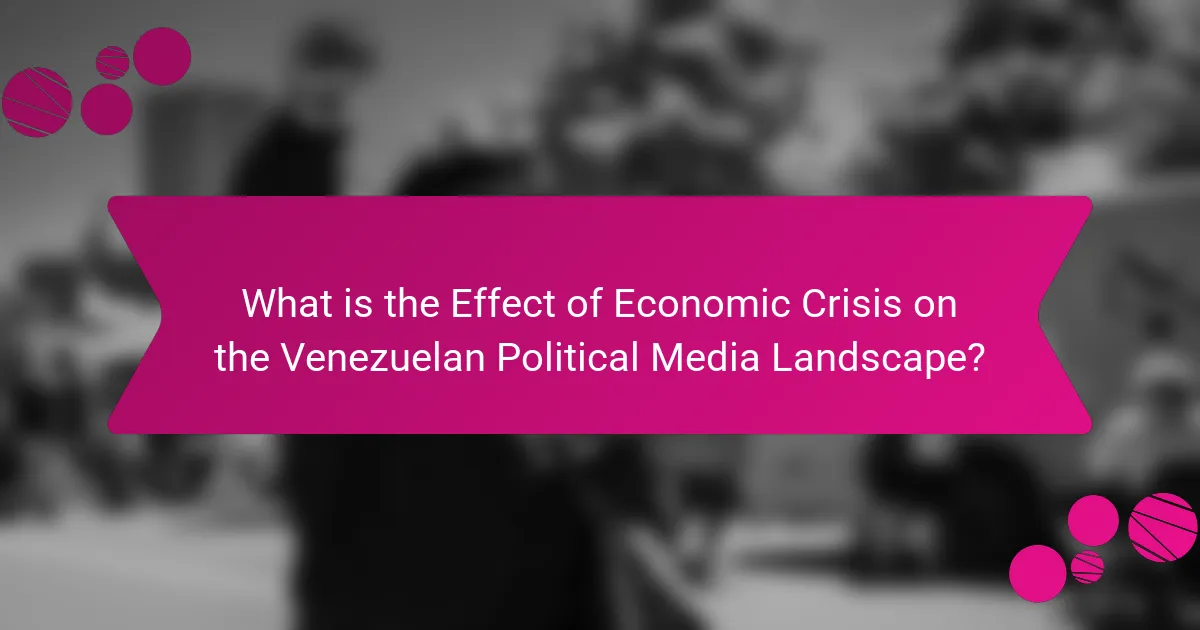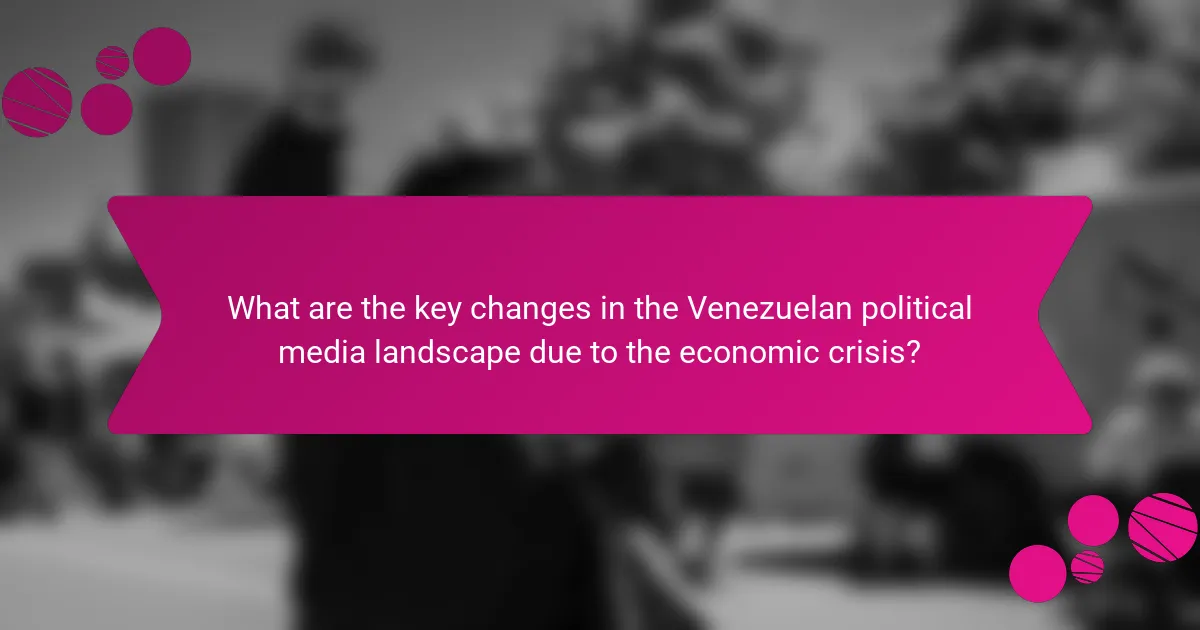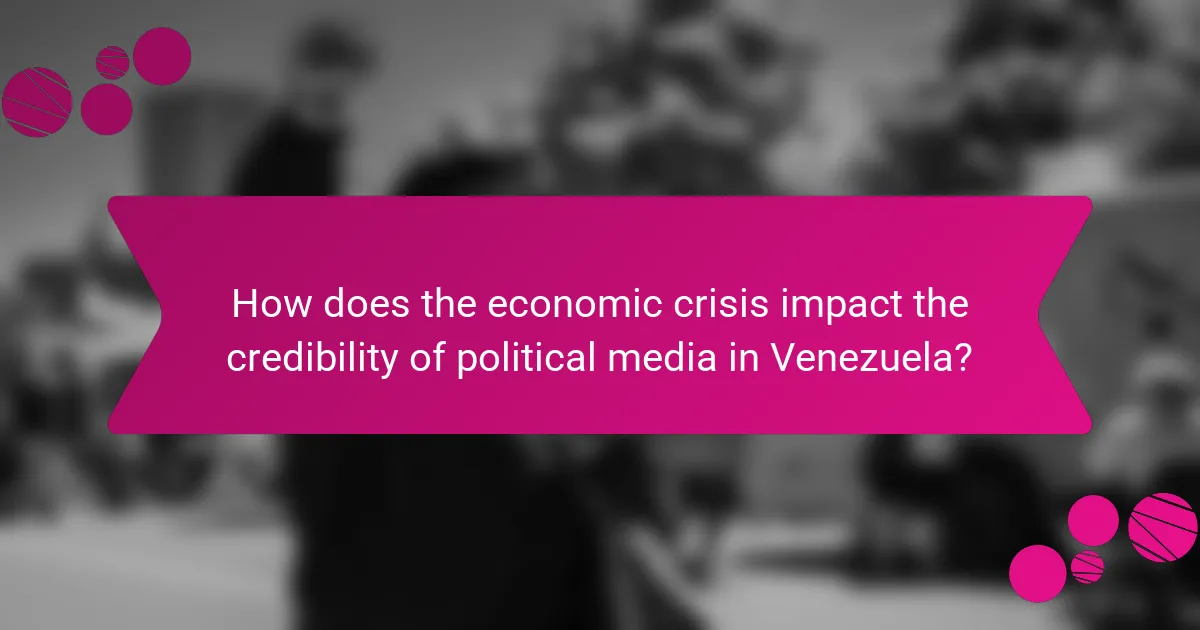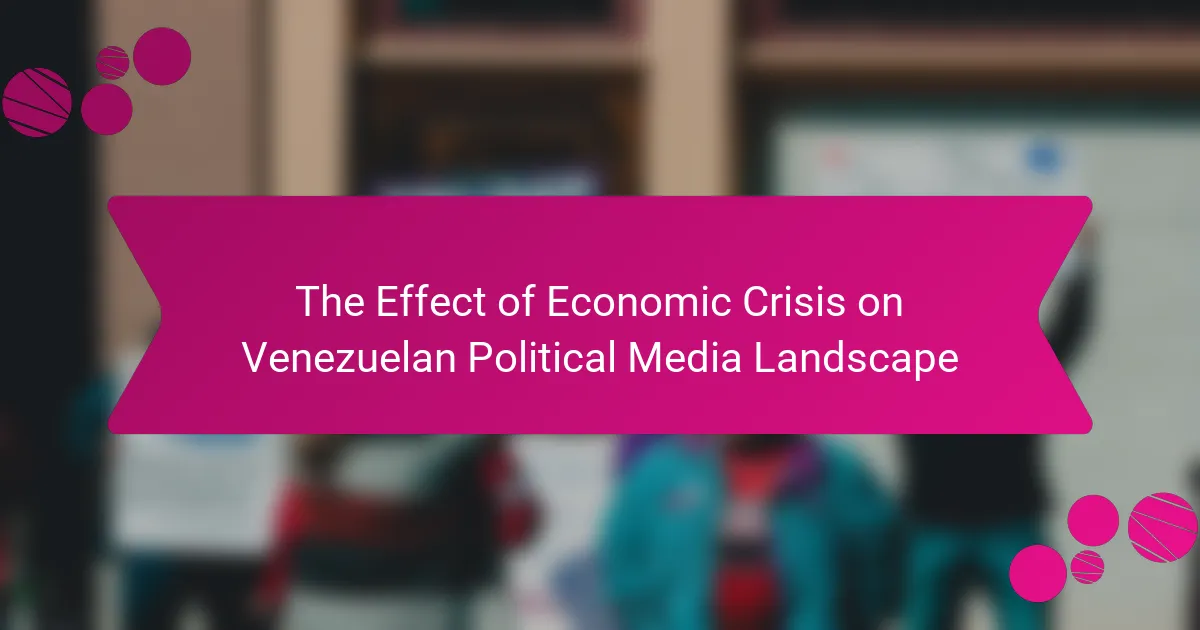
What is the Effect of Economic Crisis on the Venezuelan Political Media Landscape?
The economic crisis in Venezuela has significantly altered the political media landscape. Media outlets face severe financial constraints due to hyperinflation and declining advertising revenue. This has led to a reduction in the number of independent media organizations. Many journalists have fled the country, resulting in a talent drain. The government has increased censorship, limiting access to information. State-controlled media has become the primary source of news. This environment fosters propaganda and restricts diverse viewpoints. Consequently, public trust in media has diminished. The overall situation creates an echo chamber, hindering democratic discourse.
How has the economic crisis influenced media freedom in Venezuela?
The economic crisis has severely restricted media freedom in Venezuela. The government has intensified censorship and control over news outlets. Many independent media organizations have shut down due to financial constraints. Journalists face threats and harassment for reporting dissenting views. The country’s inflation rate exceeded 3000% in 2021, crippling the media industry. State-controlled media dominates the landscape, limiting diverse perspectives. Access to information has diminished significantly. International organizations have reported a decline in press freedom rankings for Venezuela.
What specific restrictions have been placed on media outlets during the crisis?
Media outlets in Venezuela have faced significant restrictions during the crisis. These restrictions include government censorship of news coverage. Authorities have imposed limits on the reporting of protests and political dissent. Journalists have been subjected to harassment and intimidation. Many media outlets have been forced to close due to financial pressures and regulatory constraints. The government has also restricted access to foreign funding for media organizations. Additionally, there are laws that penalize the dissemination of “false information.” These measures have severely limited press freedom and the ability of media outlets to operate independently.
How has censorship evolved in response to the economic conditions?
Censorship in Venezuela has evolved significantly due to economic conditions. Economic crises have led to increased government control over media outlets. The government restricts access to information to maintain power. Financial instability has diminished the viability of independent media. Many outlets have shut down due to lack of funding. The state has intensified its censorship efforts during economic downturns. For instance, during the 2014 economic crisis, the government escalated repression against dissenting voices. This included closing news agencies and blocking websites critical of the regime. The evolution of censorship reflects the government’s response to perceived threats from economic hardships.
What role does political media play in shaping public opinion during an economic crisis?
Political media plays a crucial role in shaping public opinion during an economic crisis. It serves as a primary source of information for the public. During economic downturns, media outlets often highlight government actions and economic policies. This coverage can influence perceptions of leadership effectiveness. For instance, in Venezuela, political media has been pivotal in framing the economic crisis narrative. Research shows that media portrayal directly affects public trust in government. According to a study by the Pew Research Center, 62% of respondents felt that news coverage influenced their views on economic policies. Additionally, political media can mobilize public sentiment, either in support or opposition to government measures. Thus, the role of political media is significant in guiding public opinion amidst economic challenges.
How do media narratives affect political engagement among Venezuelans?
Media narratives significantly influence political engagement among Venezuelans. These narratives shape public perception and inform citizens about political issues. In Venezuela, media outlets often reflect the polarized political climate. This polarization can mobilize citizens towards political actions or discourage engagement due to disillusionment. Research indicates that media consumption correlates with political awareness and activism. For instance, a study by the Latin American Public Opinion Project found that increased access to independent media leads to higher political participation. Thus, the nature of media narratives directly impacts how Venezuelans engage with their political environment.
What are the implications of media bias in a politically charged environment?
Media bias in a politically charged environment can significantly distort public perception. It shapes narratives that influence voter behavior and political engagement. Biased reporting can lead to increased polarization among the populace. This polarization often results in a divided electorate with entrenched views. In Venezuela, for example, state-controlled media promotes government narratives while independent outlets face censorship. Research shows that biased media coverage can exacerbate social tensions. The implications extend to undermining trust in journalism and democratic institutions. Ultimately, media bias affects the quality of public discourse and policy-making.

What are the key changes in the Venezuelan political media landscape due to the economic crisis?
The Venezuelan political media landscape has undergone significant changes due to the economic crisis. A major shift includes the decline of independent media outlets. Economic constraints have led to increased government control over media operations. Many journalists have faced censorship or threats, limiting freedom of expression. Additionally, there has been a rise in digital media usage as traditional outlets struggle. Social media platforms have become crucial for disseminating information. The economic crisis has also caused a reduction in advertising revenue for media companies. Consequently, many outlets have reduced staff or ceased operations entirely. Overall, the economic crisis has transformed the Venezuelan media into a more controlled and less diverse environment.
How have traditional media outlets adapted to the economic challenges?
Traditional media outlets in Venezuela have adapted to economic challenges by diversifying revenue streams and embracing digital platforms. Many have shifted from print to online formats to reduce costs. This transition allows for broader audience reach and engagement. Additionally, some outlets have developed subscription models to generate consistent income. Others rely on donations and crowdfunding to support operations. Partnerships with international organizations have also provided financial assistance. These adaptations are crucial as advertising revenue has significantly declined. According to reports, traditional media in Venezuela has faced a 90% drop in ad spending since 2015.
What strategies have been employed by newspapers and television stations?
Newspapers and television stations in Venezuela have employed several strategies to navigate the economic crisis. They have shifted towards digital platforms to reach wider audiences. This transition is driven by declining print circulation and advertising revenue. Many outlets are enhancing their online presence through social media engagement. They focus on local news coverage to cater to community interests. Additionally, some stations have adopted subscription models to generate revenue. Collaboration with international media has also increased for resource sharing. These strategies reflect the need for adaptation in a challenging economic environment.
How has audience engagement shifted in response to these adaptations?
Audience engagement has shifted towards increased online interaction in response to these adaptations. Traditional media consumption has declined as audiences seek real-time information. Social media platforms have become primary sources for news and political discourse. Engagement metrics show higher activity levels on platforms like Twitter and Facebook. This shift allows for immediate feedback and participation in discussions. Audiences are more likely to share content that resonates with their experiences. The economic crisis has intensified the demand for relevant, localized information. These changes reflect a more active and participatory audience in the Venezuelan political media landscape.
What new forms of media have emerged in Venezuela during the crisis?
New forms of media that have emerged in Venezuela during the crisis include independent online news platforms and social media activism. These platforms provide alternative news sources in response to state-controlled media. Examples include digital outlets like Efecto Cocuyo and El Pitazo. Social media has also become a vital tool for citizens to share information. Platforms like Twitter and Instagram facilitate grassroots journalism. This shift reflects a growing demand for transparency and accountability. The rise of these media forms highlights the resilience of Venezuelans amid censorship.
How has social media changed the political discourse in Venezuela?
Social media has significantly transformed political discourse in Venezuela. It has provided a platform for citizens to express dissent against the government. This shift has been crucial during times of political unrest. Social media allows for rapid dissemination of information. Traditional media in Venezuela often faces censorship or government control. Platforms like Twitter and Facebook enable real-time updates and mobilization. The 2014 protests against the government were largely organized through these channels. Additionally, social media has facilitated international attention on Venezuelan issues. This change has empowered grassroots movements and altered political engagement in the country.
What are the risks and benefits of citizen journalism in this context?
Citizen journalism in the context of the Venezuelan political media landscape presents both risks and benefits. The primary benefit is that it empowers citizens to share real-time information, especially in areas where traditional media is restricted. This has been crucial during the economic crisis, as citizens can document events and share their perspectives on social media platforms.
However, the risks include the potential for misinformation. Without professional training, citizen journalists may inadvertently spread false information. Additionally, citizen journalists in Venezuela face significant legal and physical threats from authorities. Reports indicate that many have been harassed or detained for their reporting.
Overall, while citizen journalism can enhance information dissemination in crisis situations, it also poses challenges related to accuracy and safety.

How does the economic crisis impact the credibility of political media in Venezuela?
The economic crisis significantly undermines the credibility of political media in Venezuela. Increased poverty and inflation lead to widespread distrust among the population. Many citizens perceive political media as biased or manipulated by government interests. This skepticism is fueled by the government’s control over major media outlets. Reports indicate that over 80% of Venezuelans do not trust state media. The lack of independent journalism exacerbates this issue. Additionally, economic hardships limit access to diverse information sources. Consequently, citizens rely on social media, which often lacks verification. This shift creates a fragmented media landscape, further eroding credibility.
What factors contribute to the perception of media credibility among the public?
Factors that contribute to the perception of media credibility include the accuracy of information, transparency of sources, and consistency of reporting. Public trust is influenced by the perceived objectivity of the media. Media outlets that provide fact-checked content are often viewed as more credible. The reputation of journalists also plays a significant role in shaping perceptions. Audience familiarity with the media outlet can enhance credibility. Additionally, social media presence and audience engagement impact how the public perceives media reliability. A study by the Pew Research Center found that 62% of Americans believe news organizations are often influenced by powerful people and organizations, affecting credibility perceptions.
How do economic pressures affect journalistic integrity and reporting standards?
Economic pressures compromise journalistic integrity and reporting standards. Financial constraints often lead to reduced resources for investigative journalism. This can result in reliance on less thorough reporting or sensationalism to attract audiences. Additionally, media outlets may prioritize profit over truth, leading to biased coverage. For instance, in Venezuela, economic instability has forced many journalists to accept lower pay and work under duress. This environment fosters self-censorship and limits critical reporting on government actions. Studies show that economic challenges directly correlate with declines in the quality of news coverage.
What role does misinformation play in shaping public trust in media?
Misinformation significantly undermines public trust in media. It creates confusion and skepticism regarding factual reporting. When audiences encounter false information, they may question the credibility of all media sources. This skepticism is particularly pronounced in politically charged environments, such as Venezuela. Research indicates that during economic crises, misinformation proliferates, exacerbating distrust. A study by the Reuters Institute for the Study of Journalism found that 63% of people believe that misinformation has a negative impact on their trust in news outlets. In Venezuela, the economic crisis has led to heightened misinformation, further eroding public confidence in the media landscape.
What lessons can be learned from the Venezuelan experience regarding media and economic crises?
The Venezuelan experience highlights the critical role of media during economic crises. Media can serve as a tool for both government propaganda and independent reporting. In Venezuela, state control over media limited access to unbiased information. This led to misinformation and public distrust. Economic crises can exacerbate media polarization. The Venezuelan case shows that diverse media sources are essential for informed public discourse. Additionally, international media coverage can influence domestic perceptions and responses. The necessity of protecting press freedom is evident in Venezuela’s struggle. These lessons emphasize the importance of a resilient media landscape during economic turmoil.
How can other countries prepare for similar challenges in their media landscapes?
Countries can prepare for similar challenges in their media landscapes by implementing robust media regulations. These regulations should prioritize transparency and accountability in media ownership. Establishing independent regulatory bodies can help oversee media practices and ensure fairness. Investing in media literacy programs is essential for the public to critically evaluate information sources. Supporting diverse media outlets can enhance pluralism and reduce monopolistic practices. Countries should also create emergency response plans for media operations during crises. Historical examples, such as the regulatory frameworks in Scandinavian countries, showcase effective strategies for maintaining media integrity.
What best practices can be adopted to maintain media integrity during economic downturns?
Maintaining media integrity during economic downturns involves several best practices. First, media organizations should prioritize transparency in their operations. This includes disclosing funding sources and potential conflicts of interest. Second, journalists must adhere to strict ethical standards. This ensures that reporting remains unbiased and fact-based. Third, investing in training for media staff is crucial. Training enhances skills in critical thinking and ethical decision-making. Fourth, fostering community engagement helps build trust. Engaging with audiences can clarify the media’s role and purpose. Finally, diversifying revenue streams can reduce dependency on a single source of income. This strategy helps maintain editorial independence and integrity during financial challenges.
The main entity of this article is the Venezuelan political media landscape, which has been profoundly impacted by the ongoing economic crisis. The article examines how hyperinflation and declining advertising revenue have led to increased government censorship, a reduction in independent media organizations, and a significant talent drain among journalists. It highlights the role of political media in shaping public opinion, the implications of media bias, and the emergence of new forms of media, including social media and citizen journalism. Additionally, the article discusses the risks and benefits associated with these changes and offers insights into maintaining media integrity during economic downturns.
